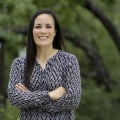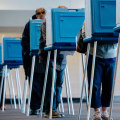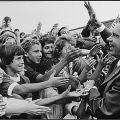As the 2020 election season heats up, candidates in Southeast Texas are gearing up for a fierce battle to win over voters. However, in this region, where religion and social issues hold significant influence, the role of these factors in candidate campaigns cannot be ignored.
The Religious Landscape of Southeast Texas
Southeast Texas is known for its strong religious presence, with Christianity being the dominant faith. According to a 2014 survey by the Pew Research Center, 77% of adults in this region identify as Christian, with the majority being Protestant. This religious influence is evident in the numerous churches and religious organizations that dot the landscape. Religion plays a significant role in the lives of many people in Southeast Texas, and it often shapes their beliefs and values.As such, it is not surprising that religion also plays a crucial role in candidate campaigns.
The Role of Religion in Candidate Campaigns
Religion has always been intertwined with politics in the United States, and Southeast Texas is no exception. Many candidates in this region use their religious beliefs to appeal to voters and gain their support. One way candidates incorporate religion into their campaigns is by attending church services and events. This allows them to connect with voters on a personal level and showcase their faith. It also gives them an opportunity to address issues that are important to religious communities, such as abortion and same-sex marriage.Religious endorsements also play a significant role in candidate campaigns.In Southeast Texas, where churches hold considerable influence, an endorsement from a prominent religious leader can sway voters towards a particular candidate. This is especially true for conservative candidates who align with the values of the religious community. However, it is essential to note that religion can also be a double-edged sword in candidate campaigns. While it can help candidates gain support from religious voters, it can also alienate those who do not share the same beliefs. This is why candidates must strike a delicate balance when incorporating religion into their campaigns.
Social Issues and Candidate Campaigns
Aside from religion, social issues also play a significant role in candidate campaigns in Southeast Texas.These issues, which include immigration, gun control, and healthcare, are often hotly debated and can sway voters' opinions. One of the most pressing social issues in Southeast Texas is immigration. With its proximity to the Mexican border, this region has a large immigrant population, and immigration policies are of great importance to many voters. Candidates who take a hardline stance on immigration may gain support from those who prioritize border security, while those who advocate for more lenient policies may appeal to voters who value diversity and inclusivity. Gun control is another contentious issue in Southeast Texas. With a strong hunting culture and a high number of gun owners, many voters in this region are passionate about their Second Amendment rights.
Candidates who support stricter gun control measures may face opposition from these voters, while those who advocate for gun rights may gain their support. Healthcare is also a crucial issue for voters in Southeast Texas. With many people in this region struggling to afford healthcare, candidates' stances on this issue can significantly impact their campaigns. Those who advocate for universal healthcare may gain support from low-income voters, while those who prioritize free-market solutions may appeal to more conservative voters.
The Importance of Addressing Social Issues in Candidate Campaigns
Ignoring social issues in candidate campaigns is not an option in Southeast Texas. These issues are deeply ingrained in the lives of voters and can significantly impact their decisions at the polls.Candidates who fail to address these issues risk losing support from key voter demographics. Moreover, with the rise of social media and the 24-hour news cycle, candidates must be prepared to address social issues that may arise during their campaigns. Failure to do so can result in negative media coverage and damage their chances of winning the election.






